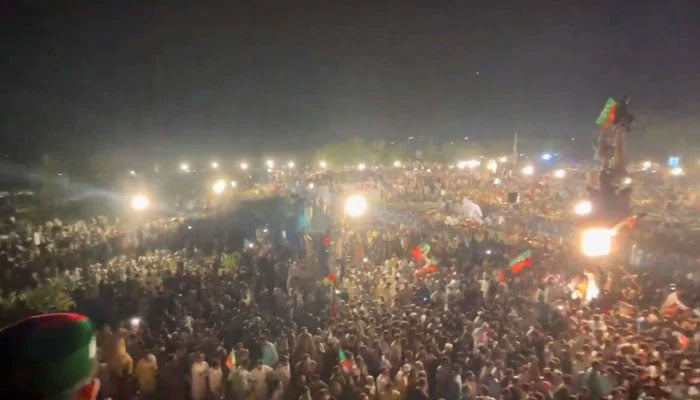Bravado or strategy?
Rally was notable not just for its size but for the controversies surrounding it
Sunday saw the PTI finally holding its much-anticipated rally in Islamabad, after the event had been postponed from its original date of August 22. The rally, held in the Sangjani area, saw a large gathering of PTI supporters who, despite roadblocks and other obstacles, came together in a show of strength. While the PTI has hailed the event as a success, the manner in which it unfolded, especially the incendiary rhetoric used against journalists, raises important questions about the direction of the party and its political strategy moving forward. The rally was notable not just for its size but for the controversies surrounding it. PTI workers clashed with security personnel after the rally was ordered to end by 7pm, as per the conditions of the no-objection certificate (NOC) issued by the Islamabad district administration. The question that naturally follows is why the government imposed a strict deadline when political rallies in Pakistan often start late and go well into the night. By imposing what many saw as an unnecessary constraint, did the government end up playing into the PTI’s hands, amplifying the rally’s hype and giving the party more attention than it perhaps would have garnered otherwise?
All that is well up for debate. What is certainly not up for debate is the true spectacle of the day that came from Khyber Pakhtunkhwa Chief Minister Ali Amin Gandapur’s speech. The crude and abusive language used and the violent imagery invoked should be condemned not just by political rivals and observers but from within the PTI itself. Gandapur’s speech targeted not only the government and the establishment but also Punjab CM Maryam Nawaz. In what is rightly being called out by journalist organizations, Gandapur also chose a no-holds-barred attack against journalists critical of the PTI – also crossing lines of misogyny that ought to concern not just journalist organizations but the PTI leadership itself.
This rally, much like the PTI’s previous political moves in recent months, raises a critical question: where is Pakistan’s politics headed if the PTI refuses to engage in dialogue? For a party that once prided itself on being a harbinger of ‘Naya Pakistan’, the PTI’s actions now seem to be steering the country toward a dangerous political deadlock. By choosing confrontation over conversation, the PTI risks alienating itself further from the political mainstream. While the rally was a demonstration of strength, it lacked substance in terms of political strategy. The fact is that Imran Khan remains behind bars, and Gandapur’s threats are unlikely to hasten his release. And the uninhibited – and unwarranted – attack on journalists is particularly worrying. In a democratic society, the media holds those in power accountable. Branding critical journalists as ‘touts’ and making personal attacks will not help anyone. It also reflects poorly not just on one individual but on the party as a whole.
In the grander scheme of things, while the party’s core supporters may revel in Gandapur’s bravado, such tactics do little to advance the PTI’s political agenda or secure Imran Khan’s release. In fact, they may be counterproductive. Pakistan’s political landscape is notoriously complex, and history has shown that long-term success comes not from threats of violence but from strategic alliances and thoughtful negotiation. With the PTI adopting a confrontational approach, the possibility of meaningful political dialogue seems increasingly remote. This is a troubling development for the country, which needs stability and cooperation among its political actors more than ever. Politics should be about more than power shows. And any solutions will have to be found by sitting on the same table.
-
 Jay-Z Shares Bold Advice With Bad Bunny For NFL Super Bowl Halftime Show Appearance
Jay-Z Shares Bold Advice With Bad Bunny For NFL Super Bowl Halftime Show Appearance -
 Epstein Probe: Bill, Hillary Clinton Call For Public Testimony Hearing
Epstein Probe: Bill, Hillary Clinton Call For Public Testimony Hearing -
 Brooklyn Beckham Considers Adoption As Nicola Peltz Can't Carry A Baby
Brooklyn Beckham Considers Adoption As Nicola Peltz Can't Carry A Baby -
 Expert Discusses 'complications' Of Measles Outbreak
Expert Discusses 'complications' Of Measles Outbreak -
 Kaley Cuoco Recalls Her Divorce With Karl Cook: 'I Was Gonna Die'
Kaley Cuoco Recalls Her Divorce With Karl Cook: 'I Was Gonna Die' -
 Celine Dion Reveals Music She's Listening To Lately
Celine Dion Reveals Music She's Listening To Lately -
 HR Exec Kristin Cabot To Speak At Crisis PR Conference After Coldplay Incident
HR Exec Kristin Cabot To Speak At Crisis PR Conference After Coldplay Incident -
 Why Travis Kelce Says Taylor Swift Has Made Him 'so Much Better'?
Why Travis Kelce Says Taylor Swift Has Made Him 'so Much Better'? -
 Halle Berry Credits This Hairstyle With Launching Her Acting Career
Halle Berry Credits This Hairstyle With Launching Her Acting Career -
 Hailee Steinfeld Spills Her 'no-phone' Rule With Husband Josh Allen
Hailee Steinfeld Spills Her 'no-phone' Rule With Husband Josh Allen -
 Bowen Yang Gets Honest About Post SNL Life: 'It’s An Adjustment'
Bowen Yang Gets Honest About Post SNL Life: 'It’s An Adjustment' -
 Charlize Theron Delivers Strong Message At 2026 Winter Olympics Opening Ceremony
Charlize Theron Delivers Strong Message At 2026 Winter Olympics Opening Ceremony -
 Lil Jon Reacts To Son Nathan Smith's Death: 'Devastated'
Lil Jon Reacts To Son Nathan Smith's Death: 'Devastated' -
 Bianca Censori Reveals Where She And Kanye West Stand On Having Children Together
Bianca Censori Reveals Where She And Kanye West Stand On Having Children Together -
 Taylor Swift Hypes Olympic Athletes In Surprise Video Message
Taylor Swift Hypes Olympic Athletes In Surprise Video Message -
 Timothy Busfield Charged With Four Counts Of Child Sexual Abuse
Timothy Busfield Charged With Four Counts Of Child Sexual Abuse




